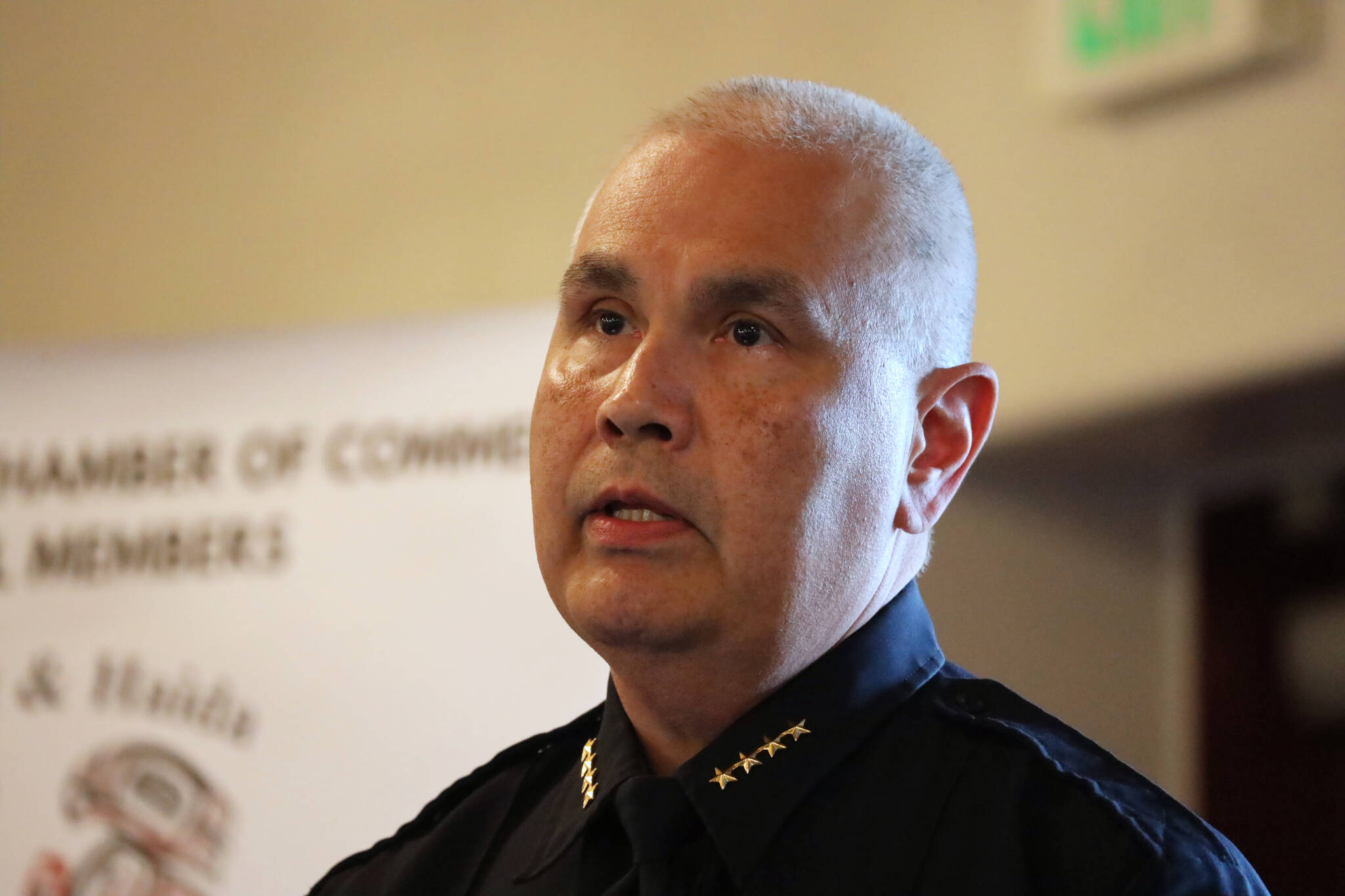This story has been updated to include additional information.
Juneau Chief of Police Ed Mercer spoke candidly about the depleted state of the Juneau Police Department’s staffing and the “major threat of drugs in our community” during a speech given to community leaders just days before he departs from his role after six years.
[JPD Chief Ed Mercer retiring]
“I think what’s really important for you all to know is that in general the police department is going to be in good hands,” he said to the crowd gathered at the Greater Juneau Chamber of Commerce luncheon Thursday afternoon.
Mercer, who has been in law enforcement in Southeast Alaska for more than 30 years and chief in Juneau since 2017, is preparing for his departure from law enforcement by partaking in a handful of events and speeches as his retirement date on Monday, July 31, rapidly approaches. Deputy Chief David Campbell, a lifelong Alaskan who has been at JPD since 1995, will serve as interim chief of police.
During his speech, Mercer emphasized a dire need to recruit more officers in Juneau, saying the department currently had more officer vacancies than he has ever seen during his time in law enforcement.
As of three months ago, the department was reported to be down 16 officers from its 57 spots available, according to Mercer. The department has since lowered that to 14 vacancies, but Mercer said retention issues are seeping into other areas of the department as well such as the dispatch center, which currently has a 33% vacancy rate.
Mercer said there is movement in the works to fill those gaps, most prominently being the department’s partnership with a private recruitment agency to aid in promoting and marketing positions in Juneau.
In addition, the department has also worked with the city in recent months to provide larger cash incentives to entice potential prospects to work in Juneau. Just this March the city announced that Juneau Police Department officers would be offering a hiring bonus of up to $30,000 in exchange for a four-year commitment to the department. The bonus includes $25,000 for entry-level police officer candidates and $30,000 for officers with at least one year of experience.
According to Mercer, the average baseline starting salary for a police officer in Juneau currently is about $110,000-115,000. He said many officers are arguing the salary is not nearly enough to afford to live in the city.
“I’ll tell you what I hear from my staff is that they can’t live here,” he said. “I’ve had seasoned officers come in and say ‘I just can’t live here because I can’t afford to live here’ — that is something that I hear frequently.”
According to JPD Employees Association Board President Sterling Salisbury, Mercer’s comment to the Chamber regarding the baseline starting salary for a police officer is inaccurate.
“The numbers are way off. A starting officer makes just over $35/hour. Patrol officers work 2080 hours a year (minus any forced overtime),” he said in an email to the Empire.
Mercer said there is also movement to add retention bonuses of up to $10,000 for dispatchers. Mayor Beth Weldon told the Empire the Assembly has already approved that type of bonus, but it is still being developed at this time.
Mercer said in addition to Juneau’s high cost of living dampening people from joining law enforcement, the recent nationwide trend of negativity attached to law enforcement following the police murder of George Floyd, is also hindering JPD and other agencies across the state from gaining new officers.
“The number one thing that officers asked me is does your community, your Assembly, your city manager support you guys?” he said. “George Floyd happened and that was ugly — it is good it was pointed out — we had to defend ourselves as law enforcement and say, ‘That’s not us.’ I think we did a really good job here in the police department to do that when we were under attack in that regard.”
He said community engagement and support are critical for the police department and officers to thrive in the Juneau community, and properly address community issues like the rising threat of illegal drug trafficking in the city.
“Drugs play such a role in crime in our community and it’s not going to go away, we just have to continue to try and put forth our best efforts to try to intercept the drugs coming in to work with our prosecutors and courts,” he said.
According to Mercer, in just the past three months the Juneau Police Department alongside the Southeast Alaska Cities Against Drugs have intercepted about 23,000 fentanyl pills from being dispersed in Juneau. He said the increase in illegal drug trafficking in Juneau is only going to increase and proper community education is critical to warning adults and youth about the dangers of fentanyl and other illegal drugs.
Along with education and prevention measures, Mercer argued Juneau needs more treatment options.
“Hopefully one day this state gets on board with setting up good places for individuals to go for treatment because I don’t think we have enough of that in our community or in our state in general, and I think that’s the other half that sometimes is forgotten,” he said.
He thanked the leaders for their support during his time as chief and as a resident of Juneau.
“I believe that in general we have really good support for our police department and I think our community does appreciate what we do,” he said. “I think sometimes people are uneducated, and it’s our job to educate people, and it’s been an honor to be your chief of police and I look forward to good things to come forward.”
• Contact reporter Clarise Larson at clarise.larson@juneauempire.com or (651)-528-1807. Follow her on Twitter at @clariselarson.

